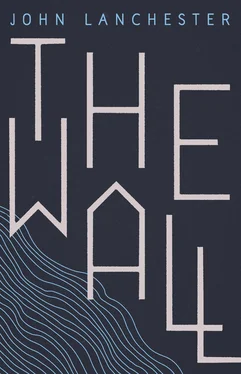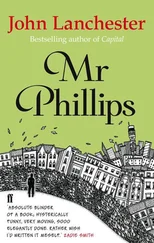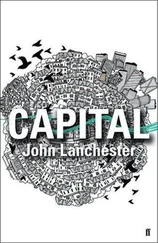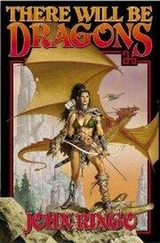John Lanchester - The Wall
Здесь есть возможность читать онлайн «John Lanchester - The Wall» весь текст электронной книги совершенно бесплатно (целиком полную версию без сокращений). В некоторых случаях можно слушать аудио, скачать через торрент в формате fb2 и присутствует краткое содержание. Год выпуска: 2018, ISBN: 2018, Издательство: Faber & Faber, Жанр: Современная проза, на английском языке. Описание произведения, (предисловие) а так же отзывы посетителей доступны на портале библиотеки ЛибКат.
- Название:The Wall
- Автор:
- Издательство:Faber & Faber
- Жанр:
- Год:2018
- ISBN:978-0-571-29871-6
- Рейтинг книги:3 / 5. Голосов: 2
-
Избранное:Добавить в избранное
- Отзывы:
-
Ваша оценка:
- 60
- 1
- 2
- 3
- 4
- 5
The Wall: краткое содержание, описание и аннотация
Предлагаем к чтению аннотацию, описание, краткое содержание или предисловие (зависит от того, что написал сам автор книги «The Wall»). Если вы не нашли необходимую информацию о книге — напишите в комментариях, мы постараемся отыскать её.
The Wall — читать онлайн бесплатно полную книгу (весь текст) целиком
Ниже представлен текст книги, разбитый по страницам. Система сохранения места последней прочитанной страницы, позволяет с удобством читать онлайн бесплатно книгу «The Wall», без необходимости каждый раз заново искать на чём Вы остановились. Поставьте закладку, и сможете в любой момент перейти на страницу, на которой закончили чтение.
Интервал:
Закладка:
‘Result,’ said Cooper, pleased with himself. We left our bags and went into the pub while the Help set up our camp. Yes, I thought – this must be what it’s like to be in the elite. To have things done for you. To be on the inside. The pub was an old-time fantasy of an English inn, with saloon and lounge and snug, wood panels, cosy: you could imagine arriving here on a winter night and immediately feeling safe and warm. The landlord was, we could tell after about ten seconds, a former Defender who gave special treatment to people doing their time on the Wall. The first set of pints was on the house. We had one more round, then went back out to our tents, where the Help had begun cooking over the campsite fire. It was now dark, but a deep blue moonlit dark, the kind Defenders like. Fire, woodsmoke, mutton: everything was perfect. The Wall felt a very long way off.
The next morning I woke early, not long after first light. I got out of the tent to stretch the sleep out of me and look for coffee. I wasn’t wearing my glasses so things were blurry, and I had a sudden hallucination: a figure in white, backlit by the rising sun, slowly dancing, aflame with light. I thought: an archangel! I thought: I’m going mad! I thought: sweet baby Jesus, that’s Hughes doing tai chi. He didn’t stop or turn to look at me but kept at his practice. It was impressive and also ridiculous – impressive in part because he must have known it looked ridiculous, but that wasn’t stopping him or slowing him down. Was he good at it? I think maybe he was. It looked rhythmical enough and he didn’t fall over.
The Help wasn’t up yet but Hughes had brewed up a pot of coffee on a stove and I took some. I sat on one of the camp stools and looked out at the view. I got on well with Hughes, and the odd thing, apart from the fact that we were physically a little alike, was that he had grown up near me, a town about fifteen miles away. It turned out we knew people who’d been to school with each other. At handover once, Sarge shouted at Hughes for being in the wrong place, then when he saw who it was apologised, or sort-of apologised. His exact words were ‘Sorry, got the wrong tall thin streak of piss.’
By the time I finished a mug of coffee Hughes had finished doing his exercises.
‘Sorry,’ he said. ‘I know it looks stupid.’
‘No …’ I started to say. Then I shrugged. ‘Just different. From, you know, fix bayonet, point automatic weapon, pull trigger.’
‘I can’t do it on the Wall, people would take the mickey. I’d never hear the end of it.’
‘Yeah, I can see that.’
‘Also you’re supposed to do it outdoors and most of the time it’s too fucking cold.’
‘Yeah, I can see that too.’
‘My teacher would say I should just ignore it. The cold and the teasing. I can’t, though.’
‘What is he, some ninety-year-old Chinese dude with whiskers, who’s been doing martial arts so long he can, like, fly?’
‘No, he’s called Graham, about thirty-five, from Wolverhampton. But he does know his tai chi.’
‘You planning to go back there?’
‘No. I’m going to go to college.’ He reached down into a bag and pulled out a book, a paperback copy of Wordsworth’s selected poems. ‘I want to study literature. I might stay on at uni and teach if I can make a go of it.’
I looked at Hughes. The bulky, looming, whiskery figure I usually met trudging down the Wall in twilight, muttering curses under his breath and glaring at me and carrying an automatic weapon in his right hand rather than slung over his shoulder – that person was a skinny, gentle intellectual who did meditative martial arts and read Romantic poetry and wanted to be an academic.
‘You?’ he asked.
‘I don’t know,’ I said, and found, to my surprise, that the thought was true. I used to have secret ideas about what I wanted to do: secret in the strong sense that I had never told anyone. I wanted to get away from home (that part was no secret), to get as much education as I could, to get a job where I made lots of money, and to become a member of the elite. All this was too vague to count as a plan. I didn’t know anyone who had done it; I didn’t know the detail of how to do it; but I knew that it could be done. Elites have to let in some outsiders, that is a basic rule of how they work. It’s how they renew themselves and how they spread just enough of the benefits around to stop disorder rising from below. Also: elites need new blood because it’s the newly arrived members of the elite who know how the rest of the population are thinking, right now. Not in general terms, but right in this specific historical moment. To find that stuff out, you have to let some of them in. Somebody like me, a bright ambitious provincial boy.
This was secret, dark, private. I knew enough to know that this was not a good thing to want, and not a good way to be: that at the same time I was in the middle of my friends and peers and colleagues, my fellow Defenders, I was privately scheming to get away from them, to become somebody else. I was in effect saying that I was better than them – not saying it out loud, but doing something much worse, saying it in my heart. My deepest thought was: I’m not like you. You don’t know me.
And yet, to my surprise, I found that this secret idea of mine, about who I really was, seemed to be wearing off. The more time I spent with them, the more I realised I was more like the other Defenders than I was unlike them. At first I looked at those planes flying overhead and I longed, physically ached, to be up there looking down rather than down here looking up. To see the world spread out below, to be up there in the blue, to be so far up above you could no longer see people – that was it. To go up above people, to be away from ordinariness, to live in the pure inhuman element of height and air. I still felt the appeal of that, the thrill of it. To be up there rather than down here … but the problem was, that was the same as wishing to be above normal people, not one of them. To say, I’m more like those people up in the plane than I’m like Sarge and Yos and Mary and Cooper and Shoona and Hughes and Hifa and even my parents. To be one of them and not one of us. But I was realising that maybe I didn’t want to be one of them; maybe I liked us more than I liked them. Though those planes still looked very beautiful, and it must be amazing to be that far up, to be moving that quickly, to be able to look down as you fly …
‘Yeah, I don’t know. College. Then, I don’t know.’
‘No point pretending to know when you really don’t.’
‘No.’
Mary was the next one up. She came out of the girls’ tent yawning and stretching, her curly hair seeming to stretch too, up and out. She came over and helped herself to coffee – she was one of those temperamentally cheerful people who are hilariously moody in the morning until they’ve had some caffeine. After she finished her cup she was ready to talk.
‘I wonder what they’re planning to cook tonight,’ she said. Although one of the reasons we had Help was so that we didn’t have to cook, cooking was Mary’s hobby and chief interest as well as her job: it was just her favourite thing to do. No need to ask her what her plans were for life after the Wall. It was her favourite topic of conversation, a running reverie about what she’d do once she had the money to open her own place. (That part, the bit where she put together the money, was a little vague. But she had faith.) When she could cook whatever she wanted, as long as it was in season. She loved to talk about it.
‘The produce you could get before the Change,’ she said. ‘Everything, all the time. Tomatoes and fruits, hams from you name it, meat whenever you liked, all of it all the year around. Oils, spices, herbs all year round, anything you wanted from anywhere at any time. I read those old books, I think, it must have been too easy, you know? You could just cook anything. Whenever. It just makes you think, how did people know what to want? I mean, if it’s anything you like, any time, it’s like science fiction, where they have a machine that just makes stuff. It does your head in. Press a button, and it’s roast beef, pheasant mole, chickpea fritters in yoghurt dressing, aioli, prawn curry, mango soufflé, duck blood stir fry, consommé, you know, where does it all end? I mean, the idea is amazing, everything all the time, I get it, and yet, it’s weird and wrong too. Now, there’s less, but maybe, I don’t know, I wouldn’t say it’s better, that would be mad, obviously it’s not better, but you have to work with what you’ve got, you know, and even if it is, you know, turnips, turnips, fucking turnips yet again, at least you know you’re working with turnips because that’s what came out of the ground and that’s what you’ve got to cook and that’s what you’ve got to make interesting, because there’s no choice, you know? And then it’s cabbages or celeriac or swedes or beetroot or berries, it is whatever it is that comes out of the ground and that’s what’s amazing and beautiful about it, you know, that’s what’s interesting, not just going to the shops and being able to buy, you know, stuff that just got off a plane from who knows where.’
Читать дальшеИнтервал:
Закладка:
Похожие книги на «The Wall»
Представляем Вашему вниманию похожие книги на «The Wall» списком для выбора. Мы отобрали схожую по названию и смыслу литературу в надежде предоставить читателям больше вариантов отыскать новые, интересные, ещё непрочитанные произведения.
Обсуждение, отзывы о книге «The Wall» и просто собственные мнения читателей. Оставьте ваши комментарии, напишите, что Вы думаете о произведении, его смысле или главных героях. Укажите что конкретно понравилось, а что нет, и почему Вы так считаете.












